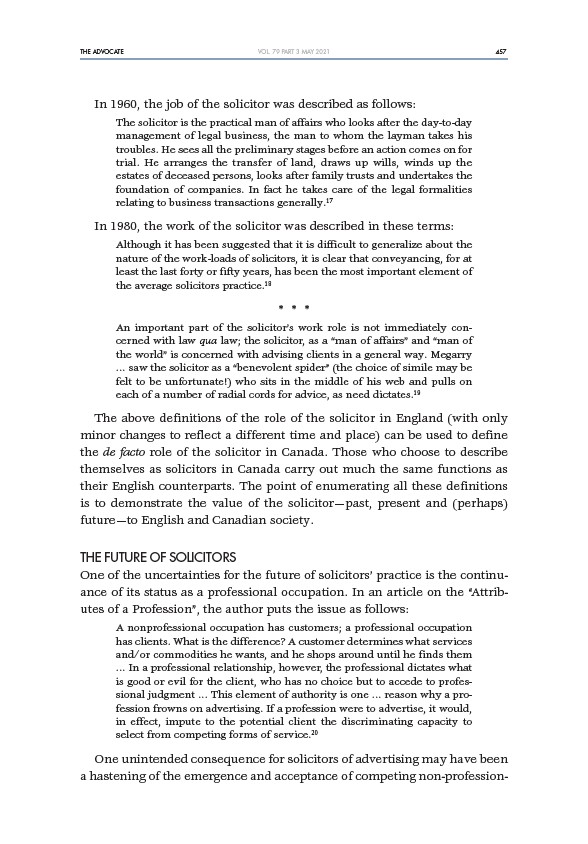
THE ADVOCATE 457
VOL. 79 PART 3 MAY 2021
In 1960, the job of the solicitor was described as follows:
The solicitor is the practical man of affairs who looks after the day-to-day
management of legal business, the man to whom the layman takes his
troubles. He sees all the preliminary stages before an action comes on for
trial. He arranges the transfer of land, draws up wills, winds up the
estates of deceased persons, looks after family trusts and undertakes the
foundation of companies. In fact he takes care of the legal formalities
relating to business transactions generally.17
In 1980, the work of the solicitor was described in these terms:
Although it has been suggested that it is difficult to generalize about the
nature of the work-loads of solicitors, it is clear that conveyancing, for at
least the last forty or fifty years, has been the most important element of
the average solicitors practice.18
* * *
An important part of the solicitor’s work role is not immediately concerned
with law qua law; the solicitor, as a “man of affairs” and “man of
the world” is concerned with advising clients in a general way. Megarry
… saw the solicitor as a “benevolent spider” (the choice of simile may be
felt to be unfortunate!) who sits in the middle of his web and pulls on
each of a number of radial cords for advice, as need dictates.19
The above definitions of the role of the solicitor in England (with only
minor changes to reflect a different time and place) can be used to define
the de facto role of the solicitor in Canada. Those who choose to describe
themselves as solicitors in Canada carry out much the same functions as
their English counterparts. The point of enumerating all these definitions
is to demonstrate the value of the solicitor—past, present and (perhaps)
future—to English and Canadian society.
THE FUTURE OF SOLICITORS
One of the uncertainties for the future of solicitors’ practice is the continuance
of its status as a professional occupation. In an article on the “Attributes
of a Profession”, the author puts the issue as follows:
A nonprofessional occupation has customers; a professional occupation
has clients. What is the difference? A customer determines what services
and/or commodities he wants, and he shops around until he finds them
… In a professional relationship, however, the professional dictates what
is good or evil for the client, who has no choice but to accede to professional
judgment … This element of authority is one … reason why a profession
frowns on advertising. If a profession were to advertise, it would,
in effect, impute to the potential client the discriminating capacity to
select from competing forms of service.20
One unintended consequence for solicitors of advertising may have been
a hastening of the emergence and acceptance of competing non-profession-